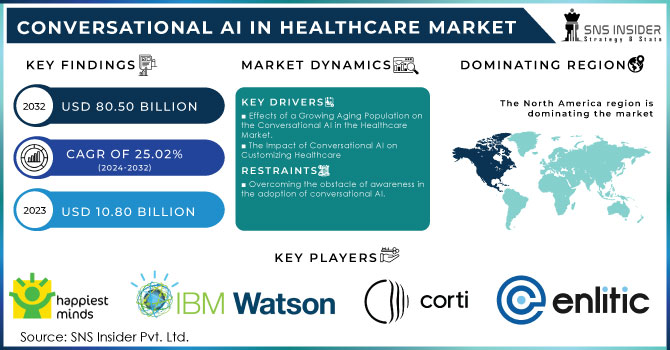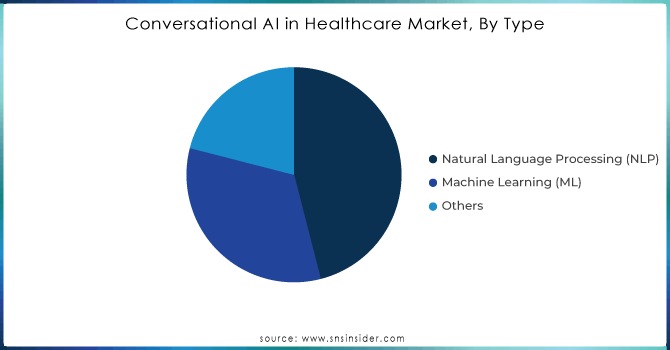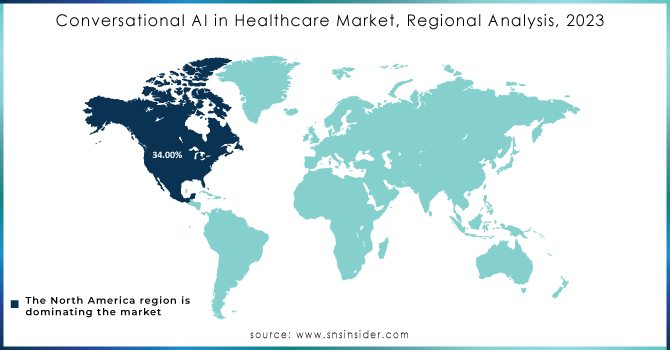Conversational AI in Healthcare Market Size & Trends
The Conversational AI in Healthcare Market Size was valued at USD 10.80 Billion in 2023 and is expected to reach USD 80.50 Billion by 2032 and grow at a CAGR of 25.02% over the forecast period 2024-2032.

Get More Information on Conversational AI in Healthcare Market - Request Sample Report
The healthcare industry is responding to significant changes, and it increasingly adopts chatbots that utilize natural language translation NLP. These programs have many benefits for the patients and medical professionals. These computer programs are highly developed and provide immediate conversational communication through NLP which gives them the ability to assist with personalized health advice, management and control of chronic diseases, and mental health support in an unparalleled way. Chatbots can be accessed by patients 24 hours a day, providing them with immediate assistance and information, which can only increase their ability and loyalty of the meetings. Chatbots perform daily office work for healthcare workers – making appointments, taking medicines, and monitoring. It reduces the length of office work for medical employees and is more efficient, enabling local locals to go to more important issues with patients. When chatbots begin to improve daily operations, their importance in connecting healthcare workers and patients and managing important everyday operations of modern healthcare is more important. It is useful for the growing cost of chatbots and their operations, which simplify the process and eliminate the need for housing everyday operations. Improvement in operations in the health care system aims to offer such benefits in the future as patient solution, assurance and handling of everyday activities, while addressing current challenges such as data protection, accuracy and system corruption. The number of people using it grows, and the future of the health care industry is not complete without focusing on chatbots.
The increase in the incidences of chronic diseases and the growing population of elderly people are major factors propelling the growth of the conversational AI market in healthcare. For instance, heart disease, cancer and diabetes among other varieties are on the rise providing a considerable challenge to global healthcare systems. Consequently, this has become and maintenance of these conditions round the clock is one of the most significant healthcare challenges in the twenty-first century healthcare. The CDC reports that chronic diseases result in 70% deaths in the United States and have contributed to an estimated USD 4.5 trillion annually in healthcare expenditures. The learning algorithms central to the working of AI chatbots provide an ideal solution to managing chronic conditions. AI chatbots are beneficial to the healthcare sector since they can monitor symptoms regularly, offer health advice tailored to each person, provide emotional support and most importantly, improve their interaction and treatment of patients. They enable the patients to obtain real-time assistance and communication, partners, patients, and helps the conversation delivered. The chat boxes guide them in their response and offer additional resources and information. They receive continuous support and education, which are essential for the maintenance of chronic health conditions. Therefore, it is a plausible and scalable solution in the management of chronic health conditions t. As such, it is capable of playing a significant role in arresting the sharp increase in chronic disease incidences, as well as the increased healthcare requirements for the elderly.
Market Dynamics
Drivers
- Effects of a Growing Aging Population on the Conversational AI in the Healthcare Market.
The rapid growth of the worldwide elderly population is having a major impact on the healthcare market for conversational AI. The increase in the elderly population, expected to double from 900 million to 2 billion by 2050, will lead to a rise in healthcare demand as they make up a larger percentage of the global population, according to WHO. Conversational AI is becoming increasingly important in meeting this rising demand, providing round-the-clock assistance and overseeing health questions for elderly individuals in need of ongoing attention and supervision. These AI-powered tools offer immediate, easy-to-use support that is crucial for managing common chronic conditions in older individuals and aiding in their overall health care. Conversational AI eases the workload of healthcare providers and guarantees elderly patients receive customized care by automating daily tasks like scheduling appointments and medication reminders. The incorporation of conversational AI in healthcare aids in optimizing healthcare delivery, increasing efficiency, and meeting the demands of an aging population. This development highlights how crucial conversational AI is in improving healthcare access and quality for a growing elderly demographic, addressing the challenges of age-related health issues and the requirement for scalable and effective healthcare solutions.
- The Impact of Conversational AI on Customizing Healthcare
The increasing need for custom-tailored healthcare has resulted in the extensive implementation of conversational AI technologies, which are set to transform the delivery of health services. Chatbots and virtual assistants, created to imitate human conversation, are leading this change. These tools powered by artificial intelligence offer personalized guidance, assistance, and actions depending on a person's specific medical background, lifestyle decisions, and current health requirements. Through the combination of information from multiple sources such as EHRs and wearable devices, conversational AI has the ability to provide personalized care plans that are both more tailored and more efficient. An AI-powered health assistant can review a patient's health information and suggest lifestyle adjustments or medications to improve treatment results. Furthermore, these resources can remind patients in advance about upcoming appointments, medication schedules, and preventive measures, guaranteeing ongoing and proactive care management. This high level of customization is especially beneficial for overseeing chronic illnesses, where continuous surveillance and prompt actions are essential for avoiding complications and enhancing quality of life. Additionally, conversational AI improves healthcare availability by offering around-the-clock support, enabling patients to ask for guidance or help whenever needed. This is particularly advantageous in regions where healthcare professionals are scarce or for people with mobility challenges. The capacity to promptly interact with a tool powered by AI lessens obstacles to receiving care and enables patients to manage their health effectively. As the world of healthcare moves towards value-based care, the need for customized, effective, and readily available healthcare options is increasing. Conversational AI is in a special position to fulfill this need, providing flexible solutions that enhance patient results and lessen the strain on healthcare systems.
Restraints
- Overcoming the obstacle of awareness in the adoption of conversational AI
A widespread lack of knowledge about the advantages and capabilities of conversational AI is a major obstacle to its widespread implementation across different industries, especially in healthcare. Many businesses and consumers are still unfamiliar with the benefits of conversational AI, which has caused hesitation in adopting these innovations despite the fast progress in AI technologies. As an example, a study showed that just 33% of customers were familiar with the term "chatbot," indicating a significant lack of awareness among the public regarding AI-based technologies. This gap also exists in the business sector, where a failure to grasp the potential of conversational AI to improve customer experiences and operational efficiencies leads to missed chances. Erroneous beliefs, such as thinking that AI integration is overly complicated or costly, and concerns about job displacement and reduced human interaction, also prevent companies from investigating AI options. Moreover, the rapid pace of technological progress frequently causes companies to fall behind on staying current with the newest trends, making the problem worse. Educational initiatives and awareness campaigns are crucial in closing this gap in awareness. Efforts should concentrate on showcasing the tangible advantages of conversational AI with case studies, interactive demonstrations, and thorough training programs. Businesses can overcome their reluctance and fully utilize the transformative potential of conversational AI in healthcare and beyond by effectively explaining how AI can enhance patient engagement, streamline operations, and drive growth.
Conversational AI in Healthcare Market Segmentation Analysis
By Type
Based on Type, Natural Language Processing (NLP) is captured the largest share revenue in Conversational AI in Healthcare Market with 46% of share in 2023. NLP, a vital element of AI that allows machines to comprehend, analyze, and react to human language, is fueling the extensive implementation of conversational AI solutions in the healthcare industry. The reason NLP dominates this market is its capacity to analyze huge volumes of unstructured medical data, such as patient records, research papers, and clinical notes. This allows for personalized and contextually relevant information to be delivered to healthcare providers and patients. Various companies are leading the way in incorporating NLP into their healthcare solutions, demonstrating creative uses of this technology. An example of this is IBM Watson Health using NLP to study medical literature and help doctors diagnose challenging cases with evidence-based treatment suggestions. In the same manner, Microsoft's Healthcare Bot service utilizes NLP to support virtual assistants that can assess patient symptoms, provide health guidance, and schedule appointments, effectively decreasing the burden on healthcare providers. These advancements show how NLP is both improving patient care and making healthcare operations more efficient by automating mundane tasks.In terms of technology, progress in NLP algorithms and models, including transformer-based structures such as GPT-4 and BERT, has greatly enhanced the precision and productivity of conversational AI systems. These models are able to understand and produce text that is similar to human speech, enabling more genuine and significant communication between patients and healthcare tools powered by AI. Moreover, the incorporation of NLP with other AI technologies like machine learning and deep learning is amplifying its functionalities, allowing for advanced examination of patient information and enhancing decision-making in the healthcare sector.

Need any customization research on Conversational AI in Healthcare Market- Enquiry Now
By Application
Based on Application, Medical Record Mining is captured the largest share revenue in Conversational AI in Healthcare Market with 35% of share in 2023. The process of medical record mining uses AI technologies to extract, analyze, and understand large amounts of patient data from electronic health records (EHRs). This procedure allows healthcare professionals to obtain valuable information, enhance patient treatment, and streamline clinical processes. The increasing use of conversational AI for mining medical records is changing how healthcare systems handle and utilize patient data, becoming essential for modern healthcare delivery. Multiple companies are leading the way in this sector, showcasing the capabilities of conversational AI to transform the management of medical records. As an example, Nuance Communications, a frontrunner in AI-driven healthcare solutions, has created the Nuance Dragon Medical One platform. This system utilizes sophisticated natural language processing (NLP) to transcribe and evaluate patient interactions, allowing healthcare professionals to record detailed clinical notes into EHRs without the need for manual input. This improves the precision and thoroughness of medical records, enabling doctors to prioritize patient care over administrative duties. Google Health is another significant instance that has been investigating the utilization of artificial intelligence in examining medical records to uncover patterns and connections in patient data that may not be readily obvious to human doctors. Using advanced deep learning algorithms, Google Health's technology can analyze extensive datasets to discover valuable information that may result in quicker identification of conditions and individualized medical care. The rising usage of conversational AI in mining medical records is directly related to the overall trend of digital transformation within the healthcare industry. As healthcare organizations progress towards digitalization, the efficiency in mining and analyzing medical records is becoming more crucial.
Regional Analysis
North America dominated the largest share in Conversational AI in Healthcare market with 34% of share in 2023. The region's strong leadership in digital technologies, especially in healthcare, is mainly due to the widespread use of AI-powered chatbots, which play a crucial role in improving patient interaction, optimizing healthcare services, and offering affordable solutions. The area's dominance in technology, especially in the United States, is supported by leading natural language processing (NLP) and AI firms that have consistently enhanced chatbot capabilities, resulting in notable advancements in accuracy, efficiency, and the overall effectiveness of healthcare services. These developments have made it easier to utilize conversational AI in tackling different issues in the healthcare industry, such as handling increasing expenses and enhancing healthcare accessibility. Due to demographic changes, rising costs, and the impact of disruptive technologies, the United States healthcare system is experiencing a major shift and has become a key area for the implementation of AI-driven solutions. The need for healthcare services that are scalable, accessible, and affordable has increased due to the projected annual healthcare expenditures in the U.S. reaching USD 6.8 trillion by 2030. Chatbots, which can offer round-the-clock assistance, handle patient queries, and help with everyday tasks, present a hopeful answer to these difficulties. The rising use of these technologies is also driven by the growing number of people joining Medicare, with more than 10,000 Americans qualifying for the program daily. It is expected that by 2030, the government will cover 48% of healthcare expenses in the U.S., underscoring the pressing requirement for effective healthcare systems to serve the growing elderly demographic.
Asia-Pacific is the second fastest growing region in Conversational AI in Healthcare market with 28% of share in 2023. The region's fast expansion is credited to its active embrace of AI technologies, fueled by rising healthcare needs, substantial investments in digital health infrastructure, and a strong focus on healthcare sector innovation. Nations such as China, Japan, South Korea, and India are leading the way in this growth, all making distinct contributions to the region's progress in conversational AI. China and Japan are at the forefront of AI research and development, with many startups and major tech companies such as Baidu, Alibaba, Tencent in China, and Fujitsu and NEC in Japan, introducing AI-based healthcare solutions for their growing elderly populations and middle classes. The options include AI-driven chatbots to engage patients, telemedicine platforms, advanced systems for mining medical records, and personalized treatment plans. the rapid urban growth in the area and the expanding middle-class have resulted in a higher need for convenient and effective healthcare options. Healthcare providers in Asia Pacific are more and more utilizing conversational AI to tackle issues like the scarcity of healthcare workers in rural areas and the demand for 24/7 patient assistance. India's growing tech industry has witnessed an increase in AI startups specializing in healthcare. For instance, companies such as Haptik and HealthifyMe have introduced AI tools to help patients with health inquiries, manage chronic diseases, and provide mental health support. The area's dedication to creativity is also shown through multiple product releases and collaborations between medical institutions and technology firms focusing on improving AI skills. An example of this is South Korea's Samsung and LG, which have been working on creating AI-based medical tools and systems that incorporate conversational AI to enhance accuracy in diagnoses and care for patients. Moreover, the expansion of 5G technology in nations such as South Korea and China is expected to drive the development of conversational AI even more.

Key Players
The Major Players are RDMD, Happiest Minds Technologies, IBM Watson Health, Corti, Enlitic, Fortis Healthcare, Butterfly Network, Google Health, Behold.ai, CloudMedX Health, iCarbonX, Oncora Medical, Recursion Pharmaceuticals, Arterys, Atomwise, Caption Health, Turbine, Babylon Health, Deep Genomics and Others Players
Recent Developments
-
In January 2024, IBM Consulting will roll out IBM Consulting Advantages, an AI services platform designed to support IBM consultants in delivering consistency, repeatability, and speed to their clients. It includes a portfolio of proprietary methods, assets, and assistants that leverage technology from IBM and strategic partners. When using aspects of IBM Consulting Advantages in an Type design, development, and testing client pilot, early adopter teams saw productivity improvements of up to 50%.
-
In January 2024, Google Cloud’s new conversational commerce solution, announced, can enable retailers to easily embed generative AI-powered virtual agents on their websites and mobile apps. Retailers can build virtual agents with helpful and nuanced conversations with shoppers using natural language and provide product options based on a shopper’s preferences.
| Report Attributes | Details |
| Market Size in 2023 | USD 10.80 Billion |
| Market Size by 2032 | USD 80.50 Billion |
| CAGR | CAGR of 25.02 % From 2024 to 2032 |
| Base Year | 2023 |
| Forecast Period | 2024-2032 |
| Historical Data | 2020-2022 |
| Report Scope & Coverage | Market Size, Segments Analysis, Competitive Landscape, Regional Analysis, DROC & SWOT Analysis, Forecast Outlook |
| Key Segments | • By Type (Natural Language Processing (NLP), Machine Learning (ML), Others) • By Application (Medical Record Mining, Medical Imaging Analysis, Medicine Development, Emergency Assistance, Others) |
| Regional Analysis/Coverage | North America (US, Canada, Mexico), Europe (Eastern Europe [Poland, Romania, Hungary, Turkey, Rest of Eastern Europe] Western Europe] Germany, France, UK, Italy, Spain, Netherlands, Switzerland, Austria, Rest of Western Europe]), Asia-Pacific (China, India, Japan, South Korea, Vietnam, Singapore, Australia, Rest of Asia-Pacific), Middle East & Africa (Middle East [UAE, Egypt, Saudi Arabia, Qatar, Rest of Middle East], Africa [Nigeria, South Africa, Rest of Africa], Latin America (Brazil, Argentina, Colombia, Rest of Latin America) |
| Company Profiles | RDMD , Happiest Minds Technologies,IBM Watson Health ,Corti ,Enlitic ,Fortis Healthcare,Butterfly Network ,Google Health,Behold.ai ,CloudMedX Health, iCarbonX,Oncora Medical ,Recursion Pharmaceuticals ,Arterys ,Atomwise ,Caption Health ,Turbine ,Babylon Health ,Deep Genomics and Others |
| Key Drivers | • Effects of a Growing Aging Population on the Conversational AI in the Healthcare Market. • The Impact of Conversational AI on Customizing Healthcare |
| RESTRAINTS | • Overcoming the obstacle of awareness in the adoption of conversational AI. |

